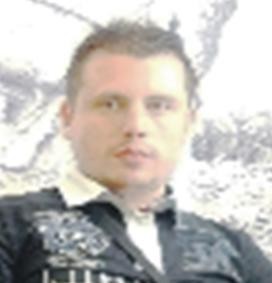On Orthodoxy and Philosophy. Dialogue between Tudor Petcu and Richard Otte
ROMÂNIA ÎN ANUL MARII UNIRI – C[entum]
Revista Luceafărul (Bt), Anul – X
On Orthodoxy and Philosophy. Dialogue between Tudor Petcu and Richard Otte
 Primit pentru publicare: 17 Nov. 2018
Primit pentru publicare: 17 Nov. 2018
Autor: Tudor PETCU
Dialog intre mine si filosoful american Richard Otte despre Ortodoxie si filosofie
Publicat: 18 Nov. 2018
Editor: Ion ISTRATE
1.) With your permission, I would like to focus first of all on the idea of „orthodox philosophy”, which in my oppinion is so important because of at least three aspects: the rebirth of Orthodoxy in the secular and postmodern society, a right-minded understanding of the Orthodox civilisation and of course the cultural importance of Orthodoxy even for the Western societies based mainly on the Catholic or Protestant identities. Talking about any orthodox philosophy could be something challenging and difficult but it is a moral duty for us to highlight the philosophical tasks of Orthodoxy. From this point of view I would like to ask you if you consider that the main characteristic of Orthodoxy could be metaphysics and when I am saying „metaphysics” I especially make reference to the Holly Fathers of the Church such as Saint Maximus the Confessor.
I think we should think more about Orthodox philosophers doing philosophy,
than Orthodox philosophy. Contemporary Orthodox philosophers approach
philosophy from different perspectives, and they often disagree in their
philosophical positions. There doesn’t seem to be something we can call
„Orthodox philosophy” that all will agree on, but there are Orthodox
philosophers whose faith influences what they think.
I know many view the job of an Orthodox philosopher as primarily expanding on
and commenting on writings of the Church Fathers. That is an interesting
project, but not one I am engaged in, nor one that Orthodox philosophers
should feel any obligation to be a part of. Orthodox philosophers are not
obligated to hold a philosophical view simply because some Church Fathers may
have held it. Philosophy, like many other disciplines, has changed and
advanced a lot from what it was when the Church Fathers wrote. Modern
Orthodox philosophers may not find the writings of the Church Fathers to be
relevant to what they are working on. For example, suppose an Orthodox
philosopher was working on formal logic; the Church Fathers were unaware of
the advances in mathematics and logic that came after them, and their writings
will be of little use to Orthodox philosophers working in this area.
Orthodox philosophers are free to work on metaphysics, but I do not think it
is obligatory that Orthodox philosophers do so. They may work in other areas,
and metaphysical issues may not be central to their work.
2.) We know very well the evolution and the foundations of the contemporary american philosophical approches and, if I’m not wrong, I think by the American philosophy we understand first of all the analytic philosophy defined especially by the philosophy of language and different theories in logics which are, of course, essential for our philosophical background. I would also take into account the contemporary american politic philosophy influenced mostly by the global justice in our days, global justice which is well-known because of Thomas Pogge. Given all I have mentioned above, which would be the place of Orthodox philosophy among these american philosophical approches?
I think that Orthodox philosophers can and should be involved in various
approaches and fields within philosophy. Christians should not limit
themselves to doing only philosophy of religion, but should feel free to
work in all fields of philosophy.
The work on global justice and poverty that you mention is an example of how
Christians can and should be involved in contemporary intellectual discussion.
For example, most Christians would reject Peter Singer’s ethical framework,
but his book „The Life You Can Save: Acting Now to End World Poverty” contains
some serious criticisms of the giving habits of many Christians. As
Christians we need to recognize that even if we financially support our
churches, we can not ignore the needs of the poor. Christian philosophers
should engage and work with those we disagree with in order to bring about
justice and a better world. Orthodox philosophers can make contributions to
philosophical debates, and also can learn from those that do not share their
basic convictions.
3.) I would be very interested to find out how do you understand the American orthodox spirituality with its own heritage, traditions and particularities. Let’s talk about for example the contributions of John Meyendorff from the intelectual point of view to the evolution of the American Orthodoxy. I wouldn’t forget Seraphim Rose too, who is deeply appreciated especially in the Eastern Europe. So, tell me please how would you characterise the American Orthodoxy.
I am not especially knowledgeable about American Orthodox thinkers, and most
of my experience with the Orthodox Church has been through attending various
parishes. I am not convinced there is any such thing as American Orthodoxy,
and I am not able to give a good characterization of the Orthodox Church in
the United States. Unlike many countries, in the United States there are
several Orthodox jurisdictions, overseen by different churches in other
countries. The Orthodox Church in the United States tends to be divided among
ethnic lines, and in my experience these ethnic churches are very protective
of their ethnicity and cultural identity. In the United States there are now
many converts to the Orthodox Church, but unfortunately many churches give the
clear impression that converts must adopt certain ethnic or cultural interests
as well as ones more central to the Orthodox faith. The Orthodox Church
contains many bright spots in the United States, but the Church will not
flourish as it could until we realize that we may have to give up some of our
cherished ideas for our Faith.
4.) What does it mean for you to be an Orthodox christian? Not least, I would like to ask you: what does it mean for you to be an Orthodox American philosopher?
I will take the first question to be asking what it means for me to be an
Orthodox Christian, as opposed to some other type of Christian. One thing I
find important in being a Christian is being connected to Christians who came
before me; it is important that there is a close connection between what I
believe and how I worship, with the worship and beliefs of Christians through
the ages. Although the Orthodox Church is not the only way to be connected to
Christians in the past, it is a good way, and one I prefer.
As for being an Orthodox American philosopher, in contrast to some Christian
faiths, the Orthodox Church puts few restrictions on what philosophical views
I can hold; I do not feel restricted to certain philosophical views because I
am Orthodox. I view philosophy as being grounded in pre-philosophical
beliefs, and what does seem important is that Christian philosophers do not
ignore their Christian beliefs when doing philosophy. Some philosophers think
we need to place our religious beliefs aside when doing philosophy, but I see
no good reason to proceed in that manner. Instead, I think Christian
philosophers should make use of their religious beliefs when developing
philosophical works.
5.) One of the deepest spiritual ideas which impressed me much and influnced my thinking remains and always will „the hidden holliness”, idea which belongs to Michael Plekon. I would like you to tell me how exactly how do you understand the hidden holliness from your own orthodox perspective.
I have only a superficial knowledge of the work of Plekon, but from what I
know of his work, I think the idea of hidden holiness is very important.
God does not expect, nor want, all of us to be priests, monks, or official saints.
6.) Which would be in your oppinion the most important role of Orthodoxy in the postmodern and pragmatic world? Could exist any common denominator between Orthodoxy and pragmatism?
I think Orthodox Christians should do philosophy, or whatever they do, as
Christians, and as Orthodox Christians. Although many Christians have a
tendency to reject all ideas that are presented by non-Christian philosophers,
we often have a lot to learn from them. You mention pragmatism, and although
I reject many ideas that are commonly associated with pragmatism, I think
there are important ideas in pragmatism that an Orthodox Christian would agree
with. For example, pragmatists often reject epistemological theories in which
rational belief and opinion are dependent only upon some epistemological rule
applied to the evidence; pragmatists such as James have argued that the will
plays an important role in epistemology. I think Orthodox Christians should
agree with this; the heart, affections, and passions, play an important role
in epistemology. Here we have an instance in which I think Christians should
side with pragmatists against many dominant views in epistemology.
7.) Given your entire orthodox experience, and I would say way of living, which is the most relevant and the deepest idea that we can found in the orthodox spirituality and theology? Would it be correct to say that Orthodoxy represents the higest and the deepest way of living?
I really don’t know enough to answer this question.
I certainly don’t think that all Orthodox Christians live a deeper or higher
life than the non-Orthodox, and I’m sure that some non-Orthodox live deeper
lives than most Orthodox.
8.) If you should recomand one book, just one book, to someone who wants to better understand the orthodox spirituality, which would be that book?
In the United States Orthodox Christians have frequent contact with protestant
evangelicals, and I am often surprised to find Orthodox Christians are
ignorant of what our church teaches about various doctrines. Given this, the
book I have most often recommended to Orthodox Christians in the United States
is a very short book, almost a pamphlet, by Kalistos Ware: „How Are We Saved?:
The Understanding of Salvation in the Orthodox Tradition.” This is not a
profound scholarly work, but it gives a good brief overview of what Orthodox
Christians have said about issues that protestants often raise.
- The Unicity of the Orthodox Spirituality
- The History of Armenian Philosophy. Dialogue between Tudor Petcu and Arshak Balayan
- The meaning of Romania and Romanian Orthodoxy for an American philosopher convert to Orthodoxy. An interview with Rico Vitz by Tudor Petcu
- The Road of a Pole to Orthodoxy. Interview of Tudor Petcu with Mateusz Blicharz
- INTERVIEW FOR THE ROMANIAN PRESS – Croatian Archbishop +Alexander
Drept de autor © 2009-2026 Revista Luceafărul. Toate drepturile rezervate.
Revista Luceafărul foloseşte cu mândrie platforma de publicare Wordpress.
Server virtual Romania
